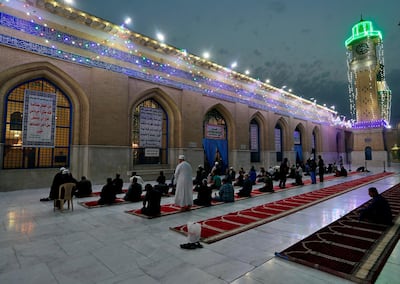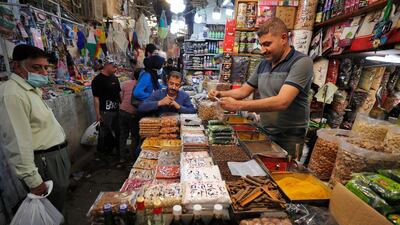Iraq on Monday announced a partial lockdown during Ramadan to prevent gatherings amid a new wave of coronavirus infections.
People will not be allowed to move freely between 8pm and 5am and there will be full lockdown on Fridays and Saturdays, the Higher Committee for Health and Public Safety said.
Pharmacies, bakeries, supermarkets and groceries are exempted from the full lockdown, while restaurants will be allowed to make food deliveries. Working hours at government offices will be shortened by a hour, and pupils of some classes can return to schools, it said.
The holy month will begin on Tuesday for Iraq's Sunni minority, and from Wednesday for Shiites. The difference is because each sect follows a different moon-sighting technique.
The Health Ministry reported 7,953 new cases on Monday and 44 deaths. The country registered 8,331 cases last Wednesday, the highest number of daily infections since the outbreak began.
The ninth month of the Islamic calendar, Ramadan is observed by Muslims across the world who abstain from food, drink, smoking and sex from daybreak to dusk. They offer extra prayers, read the Quran, show charity to the poor and cement friendships and family ties.
Usually, there is a festive atmosphere after sunset, with families and friends visiting each other or gathering at street cafes, playing traditional games like backgammon and cards or smoking shisha.
Houses across Baghdad have been decorated with traditional Ramadan lanterns, known as fanous in Arabic, and crescent moon lights. Some had posters on their doors that read: “Welcome Ramadan.”
Workers at supermarkets and sweets shops were busy stacking shelves with wide range of products favoured during Ramadan, but there were not many customers.
"In previous years, we couldn't cope with the demand and the influx of shoppers before and during Ramadan," supermarket owner Karim Mohammed, 55, told The National.
“The soaring prices of mainly food are discouraging Ramadan shoppers from stocking food for days or for the whole month,” he said as he stood amid piles of bags of pasta, rise and dairy products.
Iraq’s economy has suffered a double shock from falling oil prices and the coronavirus outbreak since last year.
Lack of funds forced the government to devalue its currency by about 23 per cent against the US dollar in December, pushing up the price of goods by up to 50 per cent as the country heavily depends on imports.
In a bid to encourage local manufacturers, the government imposed restrictions on importing some items, contributing to the increase in the prices as local supply is either not enough to meet the demand or dependent on imported raw materials.
“The government has devalued the currency and prevented the imports without any realistic calculations on the market,” Mr Mohammed said, and added that his revenues has dropped by at least 30 per cent.
The breaking of the fast usually means a variety of delicacies specially prepared for the occasion. But this year the soaring prices of food mean that many Iraqis will find it difficult to celebrate in their usual style.
Baghdad resident Riyadh Salman, who is working as a taxi driver in his retirement, considers himself lucky to be able to stock enough food for one week.
“Goods prices are on fire,” Mr Salman, 61, said as he picked up a box of bottled water from a supermarket.
“Of course, this situation has impacted us unlike previous Ramadans, when poor and middle-class could afford food on the table,” Mr Salman said.
He will distribute Ramadan packages to six families in his neighbourhood, each containing lentils, chickpeas, rice, cooking oil and a can of tomato paste.

Since Sunday, Iraqis have been sending congratulatory messages as well as calling for not sharing pictures on social media of food that many families cannot afford.
During a live radio show, a woman burst out in anger.
“We can’t buy lamb meat and chicken this Ramadan, along with other items,” said the woman, who gave her name as Hiyam.
Ahmed Najeeb, 33, said that despite the hardships Iraqis needed to count on God and look forward.
“Yes, life is not easy one here. But we have to carry on and pray for better life and future,” he said.
“One good thing this Ramadan is the Iraqi Ramadan drama that we are going to see, unlike last year,” he laughed, standing near a big poster for one of the episodes.








